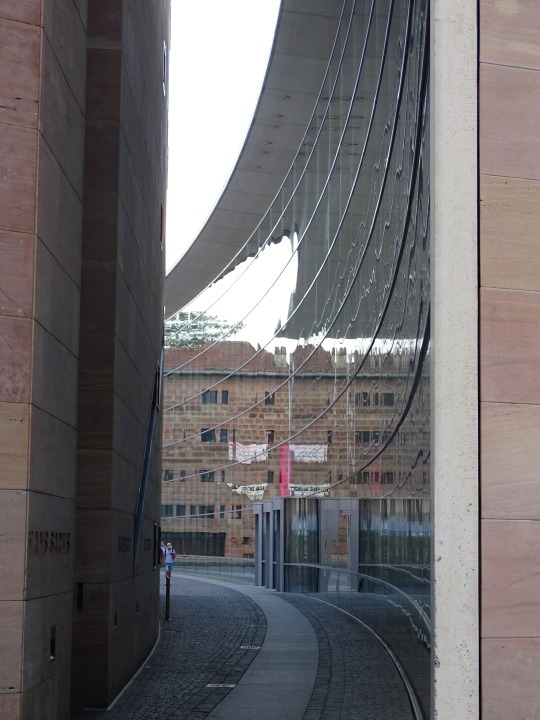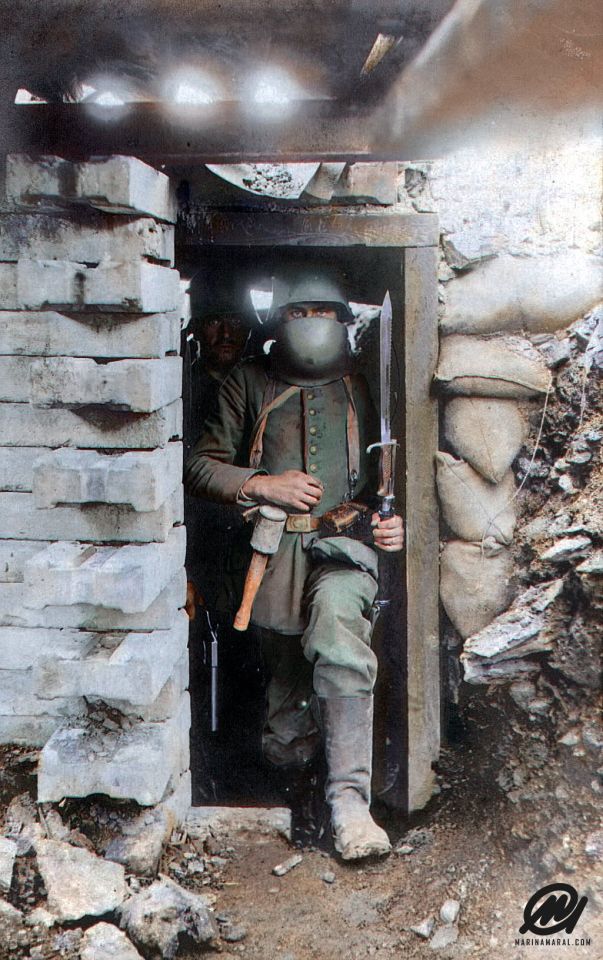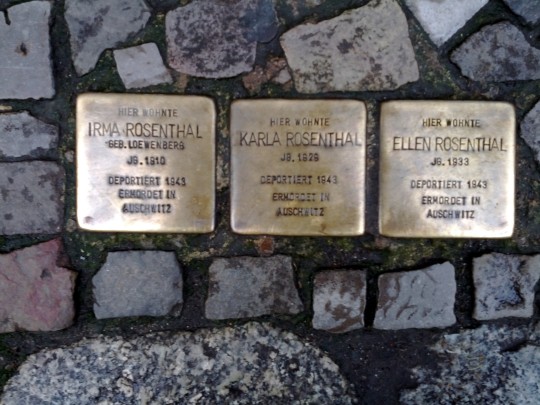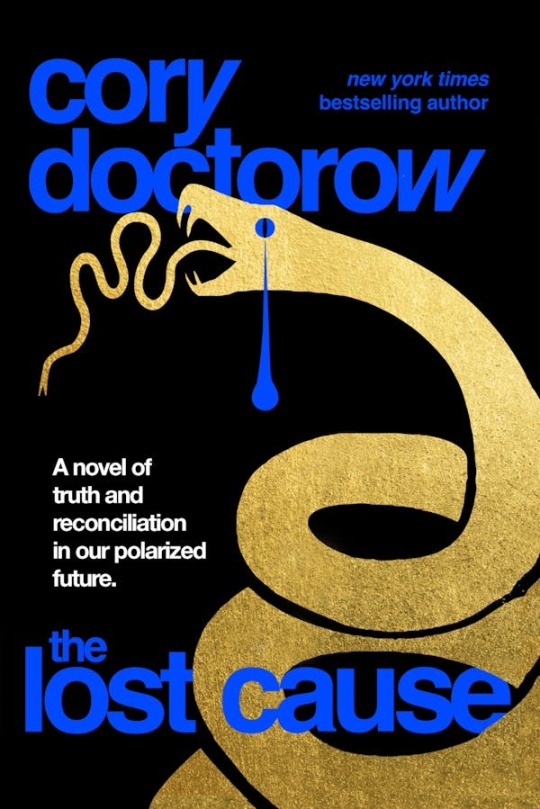#Official-deutschland
Explore tagged Tumblr posts
Text

#german stuff#bundesTag#selbstbestimmungsgesetz#deutschland#lgbtq#lsbtq#trans#trans*#for all my non german followers germany just made it easier to change your name and gender on official documents!!!#i am not actually german but i live in germany#so very happy for all my liebe deutsche Freund*innen
2K notes
·
View notes
Text






The Neues Museum Nürnberg(NMN) was officially opened on April 15, 2000.
#Neues Museum Nürnberg#NMN#Volker Staab#officially opened#15 April 2000#anniversary#German history#Nürnberg#Nuremberg#Bayern#Bavaria#Deutschland#Germany#architecture#cityscape#reflection#landmark#tourist attraction#original photography#summer 2020#downtown#old town#exterior#façade#vacation#travel#Neues Museum - Staatliches Museum für Kunst und Design Nürnberg#Luitpoldstrasse 5#New Museum - Nuremberg State Museum of Art and Design#opened
2 notes
·
View notes
Text

微博要长草了,发点碧蓝的图吧,感觉这两年画风变化好大[骷髅]
1 note
·
View note
Video
youtube
Behind The Scene of Youtube Song in Frankfurt
#youtube#frankfurt#travel#bts song#music#germany#bts official#music video#india#pakistan#deutschland#song#song lyrics#songwriter
0 notes
Text
Du bist ein blutiger Anfänger, OP. Beäuge dies:
*Tipt Schaffnerhut* M'gladbach
*tips hat* m'gladbach
316 notes
·
View notes
Text
ich bin neugierig. tagging for reichweite weil ich ein mieser kleiner opernblog bin @inoffizielles-deutschland @official-nordrheinwestfalen @official-hessen
#bin team sportklamotten vergessen#hab schulsport so gehasst#german tumblr#deutsches zeug#deutsches tumblr#deutschland
192 notes
·
View notes
Text
This official European government website explains how you can participate and vote in the Parliament Election on June 9th 2024. (In some countries as early as June 6th)
It asks you to select your country and then offers languages in which the explanation is available. It also contains an extensive FAQ for things you might want to know about the election, about voting per mail, about registering to vote, etc. etc.
“How to” für deutsche Staatsbürger:
Wie wähle ich in Deutschland?
Briefwahl
#important#european elections#eu elections#eu politics#eu wahlen#europe#please vote#register to vote#eu election 2024#election 2024#politics#european politics#european parliament#very important#current events#current news#deutschblr#deutsches tumblr
124 notes
·
View notes
Text

La Deutsch Heer est le nom officiel de l’Armée de l’Empire Allemand entre 1871 et 1919. Elle est créée par le décret “Ordnung für Kriegsbundes Armee in Deutschland” ordonnée par Otto von Bismarck (1815-1898) alors Chancelier Impérial depuis 1871. “L’Oberste Heeresleitung” est le nom donné au haut-commandement de la Deutsche Heer et à sa tête se trouve l’Empereur Allemand (titre créé en 1871 et abrogé suite à la défaite allemande de 1918.) Entouré de ses proches qui forment l’État-major Particulier ; Les aides de camp, quatre officiers d’ordonnance, plusieurs officiers adjoints et deux médecins. Il y aura trois cabinets en place : Le Militätkabinett pour les affaires militaires, le Marinekabinett pour la marine et le Geheimes Zivilkabinett pour les affaires civiles. Ainsi les chefs de la Deutsche Heer sera du 18 Janvier 1971 au 9 Mars 1888, Guillaume 1er (1797-1888), du 9 Mars 1888 au 15 Mars 1888, Frédéric III (1831-1888) et du 15 Juin 1888 au 9 Novembre 1918, Guillaume II (1859-1941). Elle est alors constituée de vingt-cinq corps d’armée qui englobe 48 divisions d’infanterie, de cavalerie et d’artillerie confondue. Toutefois, après l’unification de l’Allemagne en 1871, l’armée allemande ne combat plus en Europe, mais sera active dans les colonies telles que lors de la Révolte des Boxers et se trouvera déployer partout où l’Empire Colonial Allemand est présent. Possédant ainsi une troupe coloniale du nom de “Schutztruppen” qui ne constituait pas un corps colonial autonome comparé à d’autres nations telles que la Légion Étrangère Française ou Espagnole, elle était même dépendante non pas du Ministère de la Guerre, mais des responsables et gouverneurs locaux. Ce n’est qu’en 1891 qu’appara��t là “Kaiserliche Schutztruppe für Deutsch-Ostafrika” sous l’impulsion du Commissaire et Colonisateur Allemand, Hermann von Wissmann (1853-1905). D’abord soumise à l’autorité de la Marine Impérial Allemande (Kaiserliche Marine) elle sera en 1896 suite à une loi, soumise au même titre que les troupes coloniales à l’autorité du Bureau Colonial Impérial (Reichskolonialamt). En termes d’opération, les troupes de Wissmann seront employées en 1891 contre les Héhé, durant la rébellion Maji-Maji (1905-1907), elle connaître le Siège de Tsingtau en 1914, puis quelque temps après, elle sera alors employé lors de la 1re guerre mondiale lors de la Campagne d’Afrique de l’Est (1914-1918).
Au sein même de l’Armée, une hiérarchie se dessine. Le Corps d’Officier est généralement recruté parmi les “Junkers”, propriétaire terrien prussien et donc, noblesse foncière du pays. Les Sous-officiers sont généralement des artisans instruits, mais économiquement peu certains dû à l'industrialisation de l’Allemagne et les hommes de troupes sont généralement issus de tout horizon. En 1914, la Deutsch Heer est capable d'aligner 8 armées et qui seront en termes d'effectif de 840’000 hommes en temps de paix, puis montera rapidement à 3’750’000 hommes lors de la mobilisation. Très bien équipée, l’Infanterie Allemande possède en 1916 un casque en acier et un masque à gaz, son fusil Mauser 1898, des lance-flammes tandis que le corps de transmission possède le téléphone de campagne FF16 de Siemens. L’Artillerie et la composante blindée se composaient des canons de campagnes 7,7 cm FK 96, les énormes canons de Gamma-Gerät de 420 mm et les A7V, premier et unique char allemand développé lors de la 1re Guerre mondiale.
24 notes
·
View notes
Note
Am I wrong to assume that Rammstein started using Richard more as a backup vocalist on albums? In Untitled and especially in Zeit? Like I swear I can hear his voice and not just in Deutschland obviously.
Hi 👋
Well, he’s officially listed as a background singer for the band overall, and for the songs Radio and Deutschland (of course, and you can hear it clearly here) it’s documented that he sang along, as noted in the linked Rammwiki articles. However, it’s often the case that bands don’t necessarily list every background vocal activity of their members, which makes it a bit difficult to track.
Live, he clearly sang along on Du riechst so gut, Asche zu Asche, Tier, Puppe, Du hast and more, with Du riechst so gut being perhaps the most notorious example. Though, I have to say, while I love his growling on the live version, it doesn’t really sound to me like he’s the one in the album version - standing in a phone booth in a shirt and suspenders, speaking the lines into the phone. That sounds more like Till to me, but of course, I could be wrong.
In this small excerpt from the Zeit remix by Robot Koch, there’s clearly another male voice alongside Till’s handling the higher notes:
I strongly assume that’s Richard, as I listened to a full demo of Zeit with only his voice a while ago (though unfortunately, it’s no longer available on YouTube).
So I guess you're assuming the right thing 😊
30 notes
·
View notes
Text
I just need to know if others feel like this:
My current situation: I’m a seventeen year old, living in Germany. I would’ve been able to vote in the original polls for next year (the presidential vote I guess it would be called?) due to the revoting that will happen in either February or march (as of my knowledge) I’ve officially lost my vote.
It feels like I just have to watch everyone decide about mine and others future, watching such a big part of the country vote against mine and so many other people’s rights. It feels like my voice has been ripped from me, like it no longer matters what opinion I have just because the vote was pulled forward about 6 months. I realized that’s what it probably feels like for everybody who can’t go and vote, but it feels extra horrible to have to stand by and watch people of my generation (and other generations obviously) decide about mine and others value as human beings just because we’re different, having lost my voice when I finally had it, finally had the power to at least cancel out one vote for that messed up party, to go and participate in raising the count of the votes.
I always think about the fact that some people might say: the AfD (our version of Trumps Party, with way too many similarities to Hitlers Party) won’t win either way, but: they said that about Trump too. And now, now he is there and causes misinformation and Propaganda to be spread, causes that so many people have to live in fear of what is to come, if they can even survive the next 4 years.
It feels especially cruel to me. I can’t think about the votes too hard because it always causes a deep sense of despair, of fear inside of me. Is anyone else who is part of this group that got their vote basically ripped away feeling as upset about this as I am? Because everyone I know either isn’t in the group or just doesn’t give a f.
Rough German translation:
Ich möchte nur wissen, ob jemand sich genauso fühlt wie ich: ich bin 17 Jahre alt, lebe in Deutschland und hätte eigentlich bei den Bundestagswahlen mitwählen können. Durch die Neuwahlen (im Februar oder März nach meinem Wissensstand) habe ich diese Stimme verloren.
Es fühlt sich an, als müsste ich andere darüber beim Entscheiden zu sehen, wie die Zukunft von mir und anderen auszusehen hat, anzusehen, wie ein Teil des Landes gegen meine und die Rechte so vieler anderen stimmt. Es fühlt sich an als wäre meine Stimme mir entrissen worden, als wäre meine Meinung nicht mehr wichtig, nur weil die Wahlen 6 Monate nach vorne geschoben wurden. Ich weiß, dass es sich so für viele anfühlen muss, die eh nicht hätten wählen können, aber es fühlt sich nochmal extra schlimm, extra grausam an, dass ich nur daneben stehen kann und nichts tun kann, und zugucken muss wie andere über meinen und den Wert anderer Menschen als menschliches Wesen entscheiden, sich so viele entschieden, dass es uns nicht geben sollte, nur weil wir anders sind. Es fühlt sich extra grausam an, jetzt, wo meine Stimme, meine Möglichkeit wenigstens eine der Stimmen für diese widerliche Partei auszugleichen, mir entrissen wurde.
Ich denke immer darüber nach, dass einige sagen würden : die AfD (die Partei, mit viel zu vielen Ähnlichkeiten zur NSDAP) gewinnt doch eh nicht, aber, genau das haben sie auch über Trump gesagt. Und nun, nun ist er da und sorgt dafür, dass Falschinformation verteilt wird, sorgt dafür, dass immer mehr Angst haben müssen vor dem, was kommen wird, ob sie diese 4 Jahre überhaupt überleben können.
Ich kann jetzt nie über die Wahlen nachdenken, sie füllen mich mit Angst, mit Trauer und so, so viel Furcht. Gibt es andere, die zu dieser Gruppe von 17-jährigen gehören, die sich genauso fühlen? Weil alle die ich kenne entweder nicht zu dieser Gruppe gehören oder sich einen Dreck für interessieren.
#bundestag#wahlen#neuwahlen#angst vor der zukunft#rechtsextremismus#revote#politics#germany#fear of the future#human rights#women's rights#lgbtq rights#disability rights#gay rights#what can i do#help#mental change#anyone else?#am i alone in this?#anti afd#no afd#bad influence#nsdap#learn from history#please#gen z#german politics
20 notes
·
View notes
Text
Nations having human names is kinda odd when you think about it. You’d expect their people to just call them by their official names or else “motherland” or “fatherland.” So, here’s me coming in with a headcanon about where these human names come from (´∀`)
A nation’s legal name, the one used on treaties and trade deals, can change over time. Or be different depending on who’s speaking. Germany is Deutschland to some his friends, Japan is Nihon at home, exonyms vs. endonyms, kingdoms become republics, yadda, yadda. But a nation’s human name - their gifted name - is forever. I call it “gifted” because it’s given to them not by the politics of the world, but by one of their citizens. One of their best and brightest. A son or daughter any of them could be proud of. Any human can try giving a nation a name, but if it isn’t the right one it won’t stick.
The first nation to get a human name was China when he met Confucius. They encountered each other on the road one evening waaay back around 467BC when the philosopher was on his way home. They talked, shared tea, and Confucius called China “Yao Wang” for the first time. China couldn’t explain it, but he just knew this was his name. Knew deep in his soul
Greece was second. He marched with Alexander the Great and finished the campaign as Heracles Karpusi. When the other ancient nations heard the news they were all very excited. Except Yao, who was put out that he wasn’t unique anymore lol. Then gifted names were officially “a thing” that nation people eagerly waited for. I imagine their naming days are very fondly remembered along with the human who was there for them. A few examples throughout history:
Russia knelt before Catherine the Great and rose up again as Ivan Braginsky.
Spain was invited to read a first draft of Cervantes’s and left as Antonio Carriedo.
Japan walked with Nobunaga the day before Anegawa and went to bed that night as Kiku Honda.
One of the sole exceptions to the usual way is America, who was named “Alfred” by another nation rather than a human. Arthur named Alfred after one of his favourite kings: Alfred the Great. Alfred chose the “F. Jones” part himself when he became independent. Before that he was Alfred Kirkland. This was a weird blip in nation people history, but they chalk it up to Arthur’s magic. As for Arthur himself, he was named by Merlin. Yes, that Merlin
I haven’t thought of specifics for every nation. A few ideas are Otto von Bismarck for Ludwig, Napoleon for Francis, and maybe one of the Popes for the Italy bros. What do you guys think? What historical figure might have named your nation?
#hetalia#hws america#hws england#hws russia#hws china#hws japan#hws spain#my posts#aph america#aph england#aph russia#aph china#aph japan#aph spain
67 notes
·
View notes
Text
Denazification, truth and reconciliation, and the story of Germany's story

Germany is the “world champion in remembrance,” celebrated for its post-Holocaust policies of ensuring that every German never forgot what had been done in their names, and in holding themselves and future generations accountable for the Nazis’ crimes.
All my life, the Germans have been a counterexample to other nations, where the order of the day was to officially forget the sins that stained the land. “Least said, soonest mended,” was the Canadian and American approach to the genocide of First Nations people and the theft of their land. It was, famously, how America, especially the American south, dealt with the legacy of slavery and Jim Crow.
Silence begets forgetting, which begets revisionism. The founding crimes of our nations receded into the mists of time and acquired a gauzy, romantic veneer. Plantations — slave labor camps where work was obtained through torture, maiming and murder — were recast as the tragiromantic settings of Gone With the Wind. The deliberate extinction of indigenous peoples was revised as the “taming of the New World.” The American Civil War was retold as “The Lost Cause,” fought over states’ rights, not over the right of the ultra-wealthy to terrorize kidnapped Africans and their descendants into working to death.
This wasn’t how they did it in Germany. Nazi symbols and historical revisionism were banned (even the Berlin production of “The Producers” had to be performed without swastikas). The criminals were tried and executed. Every student learned what had been done. Cash reparations were paid — to Jews, and to the people whom the Nazis had conquered and brutalized. Having given in to ghastly barbarism on an terrifyingly industrial scale, the Germans had remade themselves with characteristic efficiency, rooting out the fascist rot and ensuring that it never took hold again.
But Germany’s storied reformation was always oversold. As neo-Nazi movements sprang up and organized political parties — like the far-right Alternative für Deutschland — fielded fascist candidates, they also took to the streets in violent mobs. Worse, top German security officials turned out to be allied with AfD:
https://www.wsws.org/en/articles/2018/08/04/germ-a04.html
Neofascists in Germany had fat bankrolls, thanks to generous, secret donations from some of the country’s wealthiest billionaires:
https://www.spiegel.de/international/germany/billionaire-backing-may-have-helped-launch-afd-a-1241029.html
And they broadened their reach by marrying their existing conspiratorial beliefs with Qanon, which made their numbers surge:
https://www.thedailybeast.com/how-fringe-groups-are-using-qanon-to-amplify-their-wild-messages
Today, the far right is surging around Europe, with the rot spreading from Hungary and Poland to Italy and France. In an interview with Jacobin’s David Broder, Tommaso Speccher a researcher based in Berlin, explores the failure of Germany’s storied memory:
https://jacobin.com/2023/07/germany-nazism-holocaust-federal-republic-memory-culture/
Speccher is at pains to remind us that Germany’s truth and reconciliation proceeded in fits and starts, and involved compromises that were seldom discussed, even though they left some of the Reich’s most vicious criminals untouched by any accountability for their crimes, and denied some victims any justice — or even an apology.
You may know that many queer people who were sent to Nazi concentration camps were immediately re-imprisoned after the camps were liberated. Both Nazi Germany and post-Nazi Germany made homosexuality a crime:
https://time.com/5953047/lgbtq-holocaust-stories/
But while there’s been some recent historical grappling with this jaw-dropping injustice, there’s been far less attention given to the plight of the communists, labor organizers, social democrats and other leftists whom the Nazis imprisoned and murdered. These political prisoners (and their survivors) struggled mightily to get the reparations they were due.
Not only was the process punitively complex, but it was administered by bureaucrats who had served in the Reich — the people who had sent them to the camps were in charge of deciding whether they were due compensation.
This is part of a wider pattern. The business-leaders who abetted the Reich through their firms — Siemens, BMW, Hugo Boss, IG Farben, Volkswagon — were largely spared any punishment for their role in the the Holocaust. Many got to keep the riches they acquired through their part on an act of genocide.
Meanwhile, historians grappling with the war through the “Historikerstreit” drew invidious comparisons between communism and fascism, equating the two ideologies and tacitly excusing the torture and killing of political prisoners (this tale is still told today — in America! My kid’s AP history course made this exact point last year).
The refusal to consider that extreme wealth, inequality, and the lust for profits — not blood — provided the Nazis with the budget, materiel and backing they needed to seize control in Germany is of a piece with the decision not to hold Germany’s Nazi-enabling plutocrats to account.
The impunity for business leaders who collaborated with the Nazis on exploiting slave labor is hard to believe. Take IG Farben, a company still doing a merry business today. Farben ran a rubber factory on Auschwitz slave labor, but its executives were frustrated by the delays occasioned by the daily 4.5m forced march from the death-camp to its factory:
https://pluralistic.net/2023/06/02/plunderers/#farben
So Farben built Monowitz, its own, private-sector concentration camp. IG Farben purchased 25,000 slaves from the Reich, among them as many children as possible (the Reich charged less for child slaves).
Even by the standards of Nazi death camps, Monowitz was a charnel house. Monowitz’s inmates were worked to death in just three months. The conditions were so brutal that the SS guards sent official complaints to Berlin. Among their complaints: Farben refused to fund extra hospital beds for the slaves who were beaten so badly they required immediate medical attention.
Farben broke the historical orthodoxy about slavery: until Monowitz, historians widely believed that enslavers would — at the very least — seek to maintain the health of their slaves, simply as a matter of economic efficiency. But the Reich’s rock-bottom rates for fresh slaves liberated Farben from the need to preserve their slaves’ ability to work. Instead, the slaves of Monowitz became disposable, and the bloodless logic of profit maximization dictated that more work could be attained at lower prices by working them to death over twelve short weeks.
Few of us know about Monowitz today, but in the last years of the war, it shocked the world. Joseph Borkin — a US antitrust lawyer who was sent to Germany after the war as part of the legal team overseeing the denazification program — wrote a seminal history of IG Farben, “The Crime and Punishment of I.G. Farben”:
https://www.scribd.com/document/517797736/The-Crime-and-Punishment-of-I-G-Farben
Borkin’s book was a bestseller, which enraged America’s business lobby. The book made the connection between Farben’s commercial strategies and the rise of the Reich (Farben helped manipulate global commodity prices in the runup to the war, which let the Reich fund its war preparations). He argued that big business constituted a danger to democracy and human rights, because its leaders would always sideline both in service to profits.
US companies like Standard Oil and Dow Chemicals poured resources into discrediting the book and smearing Borkin, forcing him into retirement and obscurity in 1945, the same year his publisher withdrew his book from stores.
When we speak of Germany’s denazification effort, it’s as a German program, but of course that’s not right. Denazification was initiated, designed and overseen by the war’s winners — in West Germany, that was the USA.
Those US prosecutors and bureaucrats wanted justice, but not too much of it. For them, denazification had to be balanced against anticommunism, and the imperatives of American business. Nazi war criminals must go on trial — but not if they were rocket scientists, especially not if the USSR might make use of them:
https://en.wikipedia.org/wiki/Wernher_von_Braun
Recall that in the USA, the bizarre epithet “premature antifascist” was used to condemn Americans who opposed Nazism (and fascism elsewhere in Europe) too soon, because these antifascists opposed the authoritarian politics of big business in America, too:
https://www.thenation.com/article/archive/premature-antifascist-and-proudly-so/
When 24 Farben executives were tried at Nuremberg for the slaughter at Monowitz, then argued that they had no choice but to pursue slave labor — it was their duty to their shareholders. The judges agreed: 19 of those executives walked.
Anticommunism hamstrung denazification. There was no question that German elites and its largest businesses were complicit in Nazi crimes — not mere suppliers, but active collaborators. Antifacism wasn’t formally integrated into the denazification framework until the 1980s with “constitutional patriotism,” which took until the 1990s to take firm root.
The requirement for a denazification program that didn’t condemn capitalism meant that there would always be holes in Germany’s truth and reconciliation process. The newly formed Federal Republic set aside Article 10 of the Nuremberg Charter, which would hold all members of the Nazi Party and SS responsible for their crimes. But Article 10 didn’t survive contact with the Federal Republic: immediately upon taking office, Konrad Adenauer suspended Article 10, sparing 10 million war criminals.
While those spared included many rank-and-file order-followers, it also included many of the Reich’s most notorious criminals. The Nazi judge who sent Erika von Brockdorff to her death for her leftist politics was given a judge’s pension after the war, and lived out his days in a luxurious mansion.
Not every Nazi was pensioned off — many continued to serve in the post-war West German government. Even as Willy Brandt was demonstrating historic remorse for Germany’s crimes, his foreign ministry was riddled with ex-Nazi bureaucrats who’d served in Hitler’s foreign ministry. We still remember Brandt’s brilliant 1973 UN speech on the Holocaust:
https://www.willy-brandt-biography.com/historical-sources/videos/speech-uno-new-york-1973/
But recollections of Brandt’s speech are seldom accompanied by historian Götz Aly’s observation that Brandt couldn’t have given that speech in Germany without serious blowback from the country’s still numerous and emboldened antisemites (Brandt donated his Nobel prize money to restore Venice’s Scuola Grande Tedesca synagogue, but ensured that this was kept secret until after his death).
All this to say that Germany’s reputation as “world champions of memory” is based on acts undertaken decades after the war. Some of Germany’s best-known Holocaust memorials are very recent, like the Wannsee Conference House (1992), the Memorial to the Murdered Jews of Europe (2005), and the Topography of Terror Museum in (2010).
Germany’s remembering includes an explicit act of forgetting — forgetting the role Germany’s business leaders and elites played in Hitler’s rise to power and the Nazi crimes that followed. For Speccher, the rise of neofacist movements in Germany can’t be separated from this selective memory, weighed down by anticommunist fervor.
And in East Germany, there was a different kind of incomplete rememberance. While the DDR’s historians and teachings emphasized the role of business in the rise of fascism, they excluded all the elements of Nazism rooted in bigotry: antisemitism, homophobia, sectarianism, and racism. For East German historians, Nazism wasn’t about these, it was solely “the ultimate end point of the history of capitalism.”
Neither is sufficient to prevent authoritarianism and repression, obviously. But the DDR is dust, and the anticommunism-tainted version of denazification is triumphant. Today, Europe’s wealthiest families and largest businesses are funneling vast sums into far-right “populist” parties that trade in antisemitic “Great Replacement” tropes and Holocaust denial:
https://corporateeurope.org/sites/default/files/2019-05/Europe%E2%80%99s%20two-faced%20authoritarian%20right%20FINAL_1.pdf
And Germany’s coddled aristocratic families and their wealthy benefactors — whose Nazi ties were quietly forgiven after the war — conspire to overthrow the government and install a far-right autocracy:
https://www.reuters.com/world/europe/25-suspected-members-german-far-right-group-arrested-raids-prosecutors-office-2022-12-07/
In recent years, I’ve spent a lot of time thinking about denazification. For all the flaws in Germany’s remembrance, it stands apart as one of the brightest lights in national reckonings with unforgivable crimes. Compare this with, say, Spain, where the remains of fascist dictator Francisco Franco were housed in a hero’s monument, amidst his victims’ bones, until 2019:
https://en.wikipedia.org/wiki/Pedro_S%C3%A1nchez#Domestic_policy
What do you do with the losers of a just war? “Least said soonest mended” was never a plausible answer, and has been a historical failure — as the fields of fluttering Confederate flags across the American south can attest (to say nothing of the failure of American de-ba’athification in Iraq):
https://en.wikipedia.org/wiki/De-Ba%27athification
But on the other hand, people who lose the war aren’t going to dig a hole, climb in and pull the dirt down on top of themselves. Just because I think Germany’s denazification was hobbled by the decision to lets its architects and perpetrators walk free, I don’t know that I would have supported prison for all ten million people captured by Article 10.
And it’s not clear that an explicit antifascism from the start would have patched the holes in German denazification. As Speccher points out, Italy’s postwar constitution was explicitly antifascist, the nation “steeped in institutional anti-fascism.” Postwar Italian governments included prominent resistance fighters who’d fought Mussolini and his brownshirts.
But in the 1990s, “the end of the First Republic” saw constitutional reforms that removed antifascism — reforms that preceded the rise of the corrupt authoritarian Silvio Berlusconi — and there’s a line from him to the neofascists in today’s ruling Italian coalition.
Is there any hope for creating a durable, democratic, anti-authoritarian state out of a world run by the descendants of plunderers and killers? Can any revolution — political, military or technological — hope to reckon with (let alone make peace with!) the people who have brought us to this terrifying juncture?

[Image ID: The Tor Books cover for ‘The Lost Cause,’ designed by Will Staehle, featuring the head of the snake on the Gadsen ‘Don’t Tread on Me’ flag, shedding a tear.]
Like I say, this is something I’ve spent a lot of time thinking about — not just how we might get out of this current mess, but how we’ll stay out of it. As is my wont, I’ve worked out my anxieties on the page. My next novel, The Lost Cause, comes out from Tor Books and Head of Zeus in November:
https://us.macmillan.com/books/9781250865939/the-lost-cause
Lost Cause is a post-GND utopian novel about a near-future world where the climate emergency is finally being treated with the seriousness and urgency it warrants. It’s a world wracked by fire, flood, scorching heat, mass extinctions and rolling refugee crises — but it’s also a world where we’re doing something about all this. It’s not an optimistic book, but it is a hopeful one. As Kim Stanley Robison says:
This book looks like our future and feels like our present — it’s an unforgettable vision of what could be. Even a partly good future will require wicked political battles and steadfast solidarity among those fighting for a better world, and here I lived it along with Brooks, Ana Lucía, Phuong, and their comrades in the struggle. Along with the rush of adrenaline I felt a solid surge of hope. May it go like this.
The Lost Cause is a hopeful book, but it’s also a worried one. The book is set during a counter-reformation, where an unholy alliance of seagoing anarcho-capitalist wreckers and white nationalist militias are trying to seize power, snatching defeat from the jaws of the fragile climate victory. It’s a book about the need for truth and reconciliation — and its limits.
As Bill McKibben says:
The first great YIMBY novel, this chronicle of mutual aid is politically perceptive, scientifically sound, and extraordinarily hopeful even amidst the smoke. Forget the Silicon Valley bros — these are the California techsters we need rebuilding our world, one solar panel and prefab insulated wall at a time.
We’re currently in the midst of a decidedly unjust war — the war to continue roasting the planet, a war waged in the name of continuing enrichment of the world’s already-obscenely-rich oligarchs. That war requires increasingly authoritarian measures, increasing violence and repression.
I believe we can win this war and secure a habitable planet for all of us — hell, I believe we can build a world of comfort and abundance out of its ashes, far better than this one:
https://tinyletter.com/metafoundry/letters/metafoundry-75-resilience-abundance-decentralization
But even if that world comes to being, there will be millions of people who hate it, a counter-revolution in waiting. These are our friends, our relatives, our neighbors. Figuring out how to make peace with them — and how to hold their most culpable, most powerful leaders to account — is a project that’s as important, and gigantic, and uncertain, as a just transition is.

Next weekend, I’ll be at San Diego Comic-Con:
Thu, Jul 20 16h: Signing, Tor Books booth #2802 (free advance copies of The Lost Cause— Nov 2023 — to the first 50 people!)
Fri, Jul 21 1030h: Wish They All Could be CA MCs, room 24ABC (panel)
Fri, Jul 21 12h: Signing, AA09
Sat, Jul 22 15h: The Worlds We Return To, room 23ABC (panel)

If you'd like an essay-formatted version of this thread to read or share, here's a link to it on pluralistic.net, my surveillance-free, ad-free, tracker-free blog:
https://pluralistic.net/2023/07/19/stolpersteine/#truth-and-reconciliation

[Image ID: Three 'stumbling stones' ('stolpersteine') set into the sidewalk in the Mitte, in Berlin; they memorialize Jews who lived nearby until they were deported to Auschwitz and murdered.]
#pluralistic#stolpersteine#historians' dispute#Historikerstreit#nazis#godwin's law#mussolini#berlusconi#italy#antifa#fascism#history#truth and reconciliation#the lost cause#denazification
247 notes
·
View notes
Text
Und für unsere explicit (!) canon queer PORN rep wählen wir Folge 4 und Folge 6, und wenn wir nur das super softe Happy End hören wollen Folge 10 (und skippen da den Rest, und denken nur, OMG the straight people)
Dieses öffentlich-rechtliche Hörspiel ist queer as f*ck. Du kannst es aber auch für offene Beziehungen und polyamorie hören, weil das kennt die Audiothek auch (since when?!?!). Und 60+ Frauen und jüngeren Lover (es gibt Frauen älter als 30 oder gar 40??? WTF.)
Kink und Fetisch A LOT.
Sex toys, self love, self care.
Porn.
Sexfantasien.
Consent.
Sex work.
Angeblich noch feministisch und politisch.
Orgasm gap.
Und Deutschland deine fünf Schauspieler*innen. Denn gendern tun wir auch.
Die Linda Selb aus dem Tatort Bremen spielt die verständnisvolle Lesbe, die croissant mit Nutella mitbringt, die Frau innerhalb von zwei Stunden zu drei Orgasmen bringt, und die kleine Tochter kennenlernen will (die Mama und ihr neuer Freundin sowieso shippt).
Queeres insane wish fulfilment.
Und manchmal auch echt too much.
It’s a ride.
Wieso macht die ARD das? Nein, warum hat mich keine*r informiert?
Ach, und Katzen.
Und Tipps dann zu Podcast zu Kinks und Co. Because why not?!?! 2024 in der ARD Audiothek 🌈
@official-neue-bundeslaender
16 notes
·
View notes
Video
youtube
Rammstein - Deutschland (Official Video)
15 notes
·
View notes
Note
The solos from Ausländer, Deutschland and Zeit are from Paul. If I remember the info is from the studio!
Well, then he did a great job 🥰
And isn't it wonderful that for Deutschland (which was Richard's initial idea, as Flake mentions in his text in the Deutschland photobook "I'm thinking if the day we sat around at Richard's and heard the theme for the first time") it is Paul who writes that lovely part of it that Richard plays so well, talk about symbiotic guitarists..
But unless you have a link and post it non-anon, it still is an 'unconfirmed fact' i'm afraid, sorry anon.
-
But talking about Deutschland, i'm taking a bit of Flake's text in the official Deutschland photobook. I'm not going to copy the whole text, but i'll take a few paragraphs that seem on topic:
"When people want me to say something about Deutschland I usually talk about the months, actually years, we spent sitting down as a band having heated discussions. Every one of us expressed his opinion in detail. All of us talked about our experiences and feelings with respect to Deutschland. Some of us even told stories about themselves that I had never heard before. Sometimes all it takes is a theme like that to set us off and we end up getting to know one another even more closely. When we now publish a song as Rammstein, all of us have to be in agreement that this is what the text is saying because every single band member embodies this song. People can only believe in us and trust us if we stand by our songs, through and through. It was during these discussions that the six of us discovered, once again, how varied our views were of the world and of Deutschland. We talked and talked. Every word in the text was turned over and examined again and again, until there were almost no words left that truly all of us could agree upon. At the end almost all we had left were associations and allusions. We aren't history teachers and we don't want to spoon-feed anyone. People should think for themselves.
Once we'd pretty much agreed on a certain text, we would then think that the music was no longer a good enough fit, and so we turned everything over again like a compost pile. Full chords or arpeggios for the guitars? In e-minor, d-minor or c-minor? You can't go any lower with this song or the bass strings will start rattling and the low sounds will lose their force.. Do we use an underlying keyboard pattern? String instruments or synthesizers? There are so many ways to design a song and you really have to try out all the variants before you can tell what works and what doesn't.
As I remember it, our days typically started with us playing 'Deutschland' in the rehearsal room. We sat in the kitchen having a nice breakfast, but kept helping ourselves to another bread roll because we were scared. Scared of the moment we'd switch on the computer and listen to the latest version of 'Deutschland'. What on earth were we thinking last night when we did this? After sleeping on it, the next morning it all somehow sounded totally different. The day before it had sounded great! And now we just wanted to switch off the computer after playing it halfway through because it sounded so stilted. So we had to work on it some more. But then, at some point, we finally had a version if the song that we liked. Deustchland would definitely be on this album."
--
This is how Rammstein make songs 🌺
24 notes
·
View notes
Text






Rammstein - Deutschland (I)
Universal Music
2019
Video Director: Specter Berlin Production: Mmaattcchh Berlin
Official Video
23 notes
·
View notes